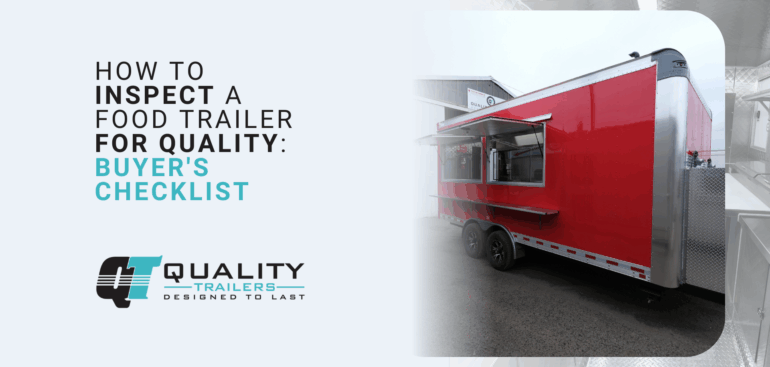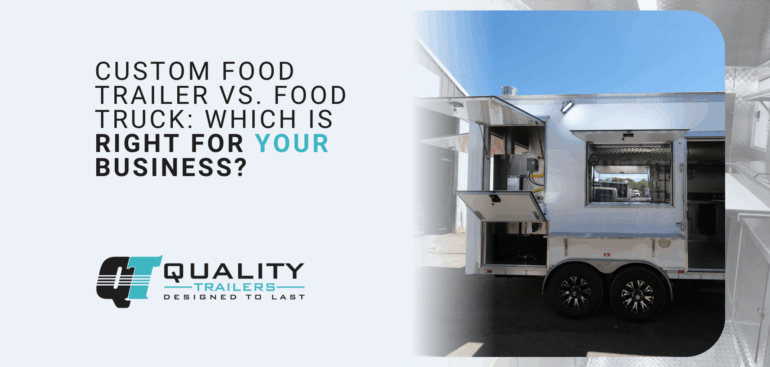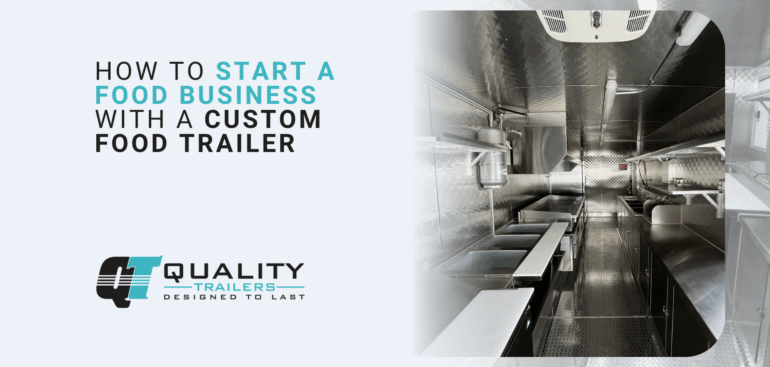Investing in a food trailer represents a significant financial commitment and the foundation of your mobile food business. Whether you’re purchasing new or used equipment, conducting a thorough inspection before finalizing your purchase can save thousands of dollars in unexpected repairs and operational delays. A comprehensive trailer inspection guide ensures you make an informed decision that supports your business goals for years to come.
The difference between a well-built food trailer and a poorly constructed one often becomes apparent only after months of operation. Hidden defects, substandard materials, or code violations can transform your dream business into a costly nightmare. Understanding what to look for during inspection empowers you to identify potential issues before they become your responsibility. This knowledge proves invaluable whether you’re working with quality trailers manufacturers or evaluating used equipment options.
Understanding the Importance of Pre-Purchase Inspection
A thorough pre-purchase inspection serves multiple critical purposes beyond simply checking if equipment turns on. It reveals the true condition of the trailer’s infrastructure, from electrical systems to structural components that affect safety and longevity. This inspection process also helps you understand the maintenance history and identify any modifications that might affect health department approvals.
Many buyers focus solely on visible equipment and aesthetics, overlooking crucial elements like frame integrity, insulation quality, and plumbing configurations. These hidden aspects often determine whether your trailer will provide reliable service or require constant repairs. Professional inspections also verify compliance with current health codes, potentially saving you from expensive retrofitting requirements after purchase.
Essential Tools and Resources for Inspection
Before beginning your inspection, gather the necessary tools to conduct a thorough evaluation. A quality control checklist tailored to food trailers helps ensure you examine every critical component systematically. Basic tools include a flashlight for dark corners, a level to check floors and counters, a moisture meter for detecting hidden water damage, and a multimeter for testing electrical systems.
Documentation plays an equally important role in the inspection process. Request maintenance records, original build specifications, and any modification documentation. Previous health department inspection reports provide valuable insights into the trailer’s compliance history. If examining a used trailer, equipment manuals and warranty information help assess remaining coverage and expected lifespan. Understanding how to choose the right food trailer for your business needs includes knowing what documentation to request.
Exterior Structural Inspection Points
Begin your inspection with a careful examination of the trailer’s exterior structure. Look for signs of damage, rust, or repairs that might indicate past accidents or ongoing issues. Check the frame for straightness and signs of stress, particularly at connection points and weight-bearing areas. The trailer’s structural integrity directly impacts its safety during transport and longevity in service.
Examine the exterior skin for dents, holes, or patches that might compromise insulation or allow water intrusion. Pay special attention to roof seams, corners, and areas around doors and windows where leaks commonly develop. The condition of doors, hinges, and locks affects both security and weather resistance. Quality trailers feature robust construction that shows minimal wear even after years of service. Learn about best materials for durable food trailer builds to understand what to look for.
Evaluating the Trailer Frame and Undercarriage
The trailer frame and undercarriage form the foundation of your mobile business, yet many buyers neglect this critical inspection area. Look for signs of rust, particularly in areas where moisture might accumulate. Check welds for cracks or poor workmanship that could indicate amateur modifications or repairs. The frame should show no signs of bending or stress that might affect towing safety.
Examine the axles, suspension, and brake systems carefully. Worn components here can lead to dangerous driving conditions and expensive repairs. Check tire condition and age, as old tires can fail unexpectedly even with good tread depth. The undercarriage should also house properly secured plumbing and electrical runs, protected from road debris and weather exposure.
Interior Layout and Space Assessment
Step inside the trailer to evaluate the layout’s functionality and efficiency. A well-designed interior maximizes every square foot while maintaining comfortable working conditions. Check counter heights, equipment placement, and traffic flow patterns. Consider whether the layout supports your intended menu and service style without requiring major modifications.
Assess storage capacity throughout the trailer, including dry storage, refrigeration space, and areas for supplies and disposables. Examine cabinet construction quality, drawer slides, and shelving stability. Poor-quality storage components lead to frustration and replacement costs. The overall interior condition reveals how well the trailer was maintained and whether it received professional construction initially.
Plumbing System Inspection
The plumbing system requires careful attention during your trailer condition assessment. Test all faucets for proper flow and temperature control. Check under sinks for leaks, proper drainage, and code-compliant installations. The three-compartment sink should drain efficiently without backing up, and hand washing stations must provide adequate hot water.
Examine the fresh water and grey water tank installations, including mounting security and connection quality. Look for proper venting and accessible cleanouts. Check that the water heater provides sufficient capacity for your operation and shows no signs of corrosion or leaks. Understanding the Oregon custom food trailer permitting process helps identify plumbing configurations that meet health department requirements.
Electrical System Evaluation
Electrical systems in food trailers face unique challenges from vibration, temperature extremes, and high demand loads. Begin by checking the main electrical panel for proper labeling, appropriate breaker sizes, and signs of overheating or amateur modifications. Test all outlets with a circuit tester to ensure proper grounding and polarity.
Evaluate the trailer’s electrical capacity against your equipment needs, including future additions. Check for adequate outlet placement that minimizes extension cord use. Examine visible wiring for proper securing and protection from damage. GFCI protection should be present near all water sources. The electrical system’s condition often indicates the overall build quality and attention to safety standards.
Kitchen Equipment Testing Procedures
Systematic equipment testing forms a crucial part of your inspection process. Start each piece of equipment and run it through full operational cycles. For cooking equipment, verify that it reaches proper temperatures and maintains them consistently. Check that all safety features function correctly, including pilot lights, thermostats, and emergency shutoffs.
Refrigeration equipment deserves special attention during equipment testing. Verify that units reach and maintain safe temperatures even in warm conditions. Listen for unusual compressor noises that might indicate impending failure. Check door seals, gaskets, and interior conditions. Testing equipment under load conditions, when possible, provides the most accurate assessment of performance capabilities.
Ventilation and Hood System Inspection
Proper ventilation affects both safety and comfort in your food trailer. The hood system should cover all cooking equipment with appropriate overlap. Check that fans operate at multiple speeds without excessive noise or vibration. Examine ductwork for proper installation, secure mounting, and absence of grease buildup that indicates poor maintenance.
Verify that the hood includes proper fire suppression systems where required. These systems need current inspection tags and properly charged extinguishers. Make-up air systems should balance exhaust air removal to prevent negative pressure issues. The overall ventilation design should align with your cooking equipment and menu requirements. Quality Trailers Inc sets the standard for safety and innovation in ventilation system design.
Flooring and Wall Condition Assessment
Food trailer flooring must withstand constant traffic, spills, and cleaning while maintaining a safe, non-slip surface. Inspect for soft spots that indicate water damage or subfloor deterioration. Check that flooring materials meet health code requirements for commercial kitchens. Proper floor slope toward drains prevents standing water issues.
Wall surfaces require similar scrutiny. Look for damage, holes, or repairs that might harbor bacteria or pests. Walls should feature smooth, cleanable surfaces throughout food preparation areas. Check for proper installation of FRP (fiberglass reinforced panels) or stainless steel where required. The condition of walls and floors often reflects the trailer’s overall maintenance history and construction quality.
Checking Doors, Windows, and Service Areas
All doors should operate smoothly, lock securely, and seal properly against weather. Check hinges for wear and proper attachment to the trailer structure. Service windows need attention to counter height, operation mechanisms, and security features. Screens or protective barriers should be intact and properly fitted.
Examine weather stripping around all openings for wear or damage that allows water intrusion or pest entry. Windows should open and close easily for ventilation when needed. Service counters must be at appropriate heights for customer interaction while maintaining food safety. These entry points significantly impact both operational efficiency and security.
Safety Features and Code Compliance
Safety features protect both your staff and business investment. Verify the presence and condition of required fire extinguishers, checking inspection tags and mounting brackets. Emergency exits must be clearly marked and functional. First aid kits, eye wash stations, and other safety equipment should be present where required by code.
Review the trailer’s compliance with current health and safety codes in your operating area. This includes proper signage, lighting levels, and required safety equipment. Electrical panels need proper labeling and accessibility. Understanding 15 things to know before buying a mobile food truck helps identify critical safety requirements.
Documentation and Certification Review
Proper documentation provides crucial insights into the trailer’s history and compliance status. Request all available build specifications, including original plans and any modification records. Health department inspection reports reveal past compliance issues and how they were resolved. Equipment manuals and warranty information help assess remaining coverage and maintenance requirements.
For used trailers, maintenance records indicate how well previous owners cared for the equipment. Look for regular service documentation rather than just repair records. Certification documents for specialized equipment like fire suppression systems must be current. Missing documentation often signals neglected maintenance or unauthorized modifications.
Testing Utilities and Connections
Utility connections require careful testing to ensure reliable operation at various locations. Check shore power connections for proper gauge wiring and secure attachments. Test the trailer’s ability to handle full electrical loads without tripping breakers or showing voltage drops. Water inlet connections should be easily accessible and include proper backflow prevention.
Propane systems need particular attention for safety reasons. Verify current tank certifications, proper regulator function, and leak-free connections throughout the system. Test all gas equipment for proper ignition and flame characteristics. Quality trailers include properly sized gas lines and accessible shutoff valves for emergency situations.
Common Red Flags to Avoid
- Evidence of extensive water damage, including stained ceilings, soft floors, or musty odors indicating hidden mold growth • Multiple electrical additions or modifications suggesting the original system was inadequate for operational needs
- Mismatched or consumer-grade equipment indicating cost-cutting measures during construction • Missing or expired certifications for critical safety systems like fire suppression or propane installations • Structural repairs or modifications that appear unprofessional or compromise the trailer’s integrity
Price Evaluation and Negotiation Strategies
Understanding the true condition of a food trailer through thorough inspection provides powerful negotiation leverage. Document all issues discovered during inspection with photos and detailed notes. Obtain repair estimates for identified problems to support price reduction requests. Consider the total investment required to bring the trailer to full operational standards.
Compare the asking price against similar quality trailers in the market. Factor in the remaining lifespan of major equipment and anticipated replacement costs. Sometimes paying more for a well-maintained trailer proves more economical than purchasing a cheaper unit requiring extensive repairs. Explore how to start a food business with a custom food trailer to understand total investment considerations.
Creating Your Personal Inspection Checklist
Develop a customized inspection checklist based on your specific operational needs and local requirements. Include items specific to your menu concept and service style. Organize the checklist by systems to ensure thorough coverage. Leave space for notes and condition ratings for each component.
Your checklist should evolve based on experience and changing regulations. Share successful inspection strategies with other food truck operators to build collective knowledge. Regular use of a comprehensive checklist prevents overlooking critical items during the excitement of trailer shopping. Consider how Portland food trailers impact food culture to understand regional trailer requirements.
Professional Inspection Services
While personal inspection provides valuable insights, professional inspection services offer expertise and objectivity. Certified inspectors understand building codes, health requirements, and common failure points in food trailers. They provide detailed reports documenting all findings and often include repair cost estimates.
Professional inspections prove particularly valuable for expensive purchases or when buying from distant locations. The inspection cost typically represents a small fraction of the total investment while potentially saving thousands in unexpected repairs. Some inspectors specialize in food service equipment and understand unique industry requirements. Learn about Portland custom food trailer design trends to understand current best practices.
Post-Inspection Decision Making
After completing your inspection, compile all findings into a comprehensive evaluation. Categorize issues by severity and repair cost. Consider whether identified problems are cosmetic, functional, or safety-related. Evaluate the total investment required against your budget and business projections.
Some issues warrant walking away from a purchase, regardless of price. Structural integrity problems, extensive code violations, or evidence of poor maintenance often indicate future problems. Conversely, minor cosmetic issues or easily replaced equipment shouldn’t necessarily disqualify an otherwise solid trailer. Understanding the future of mobile dining custom food trucks helps evaluate whether older equipment will meet evolving industry standards.
Preparing for Successful Operation
A thorough pre-purchase inspection sets the foundation for successful trailer operation. Address all identified issues before putting the trailer into service. Establish maintenance schedules based on equipment manufacturer recommendations and inspection findings. Create operational procedures that protect your investment and maintain food safety standards.
Consider inspection findings when planning your initial inventory and supply orders. Budget for any immediate improvements or equipment replacements identified during inspection. Develop relationships with qualified service providers for ongoing maintenance needs. Successful Oregon food trailer marketing strategies begin with reliable equipment that supports consistent operation.
Why Choose Quality Trailers Inc for Your Food Trailer Purchase
When searching for quality trailers that meet the highest standards, Quality Trailers Inc brings over 23 years of manufacturing excellence to every build. Our family-owned business has specialized in custom food trailers since 2010, developing deep expertise in creating mobile kitchens that exceed expectations. Every trailer we produce undergoes rigorous quality control procedures, ensuring you receive equipment built to last. Visit our homepage to explore our commitment to excellence.
Our CAD design process and experienced project management team ensure every detail meets or exceeds health department requirements. We pioneered solar panel integration in 2016, demonstrating our commitment to innovation while maintaining the structural integrity our customers depend on. Our comprehensive build process includes multiple inspection points, guaranteeing your trailer arrives ready for successful operation. Request a custom quote to discover how we can build your ideal mobile kitchen.
At Quality Trailers Inc, we understand that purchasing a food trailer represents a major business investment. That’s why we maintain transparent communication throughout the build process, providing detailed documentation and ensuring complete code compliance. Our dedication to craftsmanship means you’ll never need to worry about the thorough inspection items covered in this guide when you choose our trailers. Contact us today to learn how we can help build profitable food businesses with quality trailers built to the highest standards.
Frequently Asked Questions
How long should a comprehensive food trailer inspection take?
A thorough inspection typically requires 3-4 hours, depending on trailer size and complexity. This includes testing all equipment, examining structural components, reviewing documentation, and creating detailed notes. Rushing through inspection often means missing critical issues that could cost thousands later.
What qualifications should I look for in a professional food trailer inspector?
Look for inspectors with specific experience in food service equipment and mobile kitchens. They should understand health department requirements, electrical and plumbing codes, and structural assessment. Certification from recognized inspection organizations and references from other food trailer operators indicate qualified professionals.
When is the best time to schedule a pre-purchase inspection?
Schedule your inspection after negotiating basic terms but before finalizing the purchase. This timing allows you to use inspection findings in final negotiations or walk away if serious issues exist. Allow sufficient time between inspection and closing to address any concerns or obtain second opinions on identified issues.
What are typical costs for professional trailer inspection services?
Professional inspections generally range from $500 to $1,500, depending on trailer size, location, and inspection depth. This investment often pays for itself by identifying issues that could cost much more if discovered after purchase. Some inspectors offer basic visual inspections at lower costs, while comprehensive evaluations including equipment testing command higher fees.
Should I inspect a brand-new trailer from a manufacturer?
Yes, even new trailers benefit from independent inspection to verify build quality and code compliance. This inspection confirms that all ordered features are present and properly installed. Documentation from this inspection also provides a baseline for future maintenance and any warranty claims that might arise.




